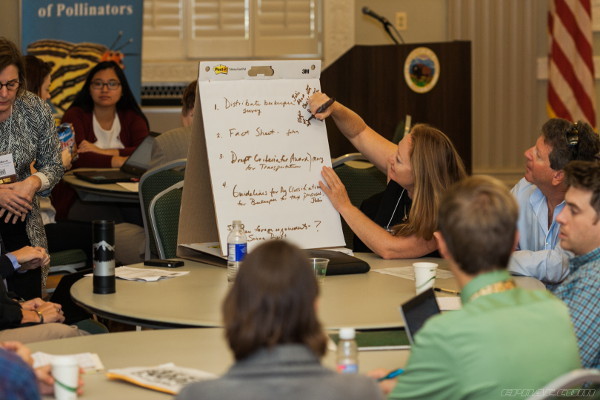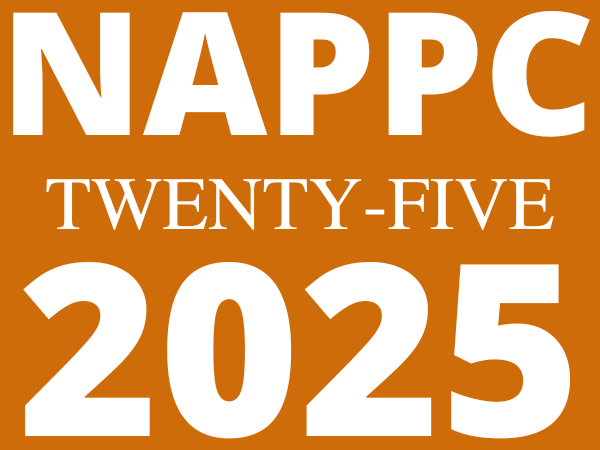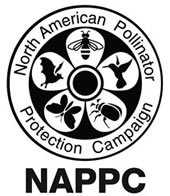NAPPC Task Forces

Task Forces are cross discipline, short-term, project-oriented groupings designed to accomplish specific task(s). NAPPC partners will have the opportunity to provide input into groups on which they do not serve. New Task Forces will be created as needed.
The Task Forces are made up of diverse, interested parties who work to accomplish one specific pollinator related task.
2024-2025 NAPPC TASK FORCES
Agriculture and Pollinators – The goal of this task force is to help address conservation and farming issues by learning from agriculture and pollinator interfaces and experiences. The task force will focus on 1). Increasing funding of practical research and quickly disseminating research results that have implications for farmers 2). Engaging farmer and crop advisor organizations to incorporate their experiences and expertise 3). Helping communication through ag extension and other agencies, including funding opportunities. We hope to include commodity groups, government agencies (including USDA/ EPA), NACD and other national associations, non-profits, crop advisors, beekeepers, agricultural commissioners, farmers, researchers, and other stakeholders.
Climate Change and Pollinators – To educate the public on the effects of climate change on plants and pollinators and to mitigate these effects through science-based programs with the goal of sustaining the connections that maintain the ecosystems that support us. This will be done through the creation of a white paper that reviews the scientific consensus regarding climate change’s effects on pollinator health and abundance. Another strategy is the development of a public-facing awareness campaign about pollinators and climate change.
Honey Bee Health – Determine priority research and evaluation criteria for 2025 Honey Bee Health Grants and develop a sponsorship plan to increase support and partnerships for honey bee health research. Promote The BeeMD app and website and disseminate information about this online tool in the beekeeping community.
Imperiled Bombus Conservation – This group will work to identify and address key stressors to imperiled bumble bee heath, determine critical bumble bee research needs, and promote scientifically sound conservation of bumble bees. This will be accomplished through a bumble bee conservation grant program, development and dissemination of resources, and other focused projects (e.g., clean stock recommendations).
Lepidoptera – This task force focuses on the role all Lepidoptera (moths and butterflies) serve as both diurnal and nocturnal pollinators. The group produces science-based outreach materials to highlight the importance of Lepidoptera and to encourage their conservation. One of the most important functions of the task force is to determine funding sources, review proposals, and provide funding for the NAPPC “Research Grants to Promote Lepidoptera Conservation.” These grants have been provided to university professors, undergraduate and graduate students, public schools, community groups, and nonprofit organizations who are dedicated to investigating and alleviating the stressors faced by butterfly and moth populations across the continent. Each project funded explores one or more identified priority areas that will improve habitat and fill research gaps concerning Lepidoptera species in North America.
Pollinator Communications – Work to create and share relevant, thoughtful, engaging, and hopeful communication campaigns about pollinators and their importance to our ecosystems. The goal for this group centers on elevating the work of the pollinator community at large (including other NAPPC Task Forces) and educating the public on the importance of pollinators. This is currently being done by analyzing the results of the Pollinator Communication Survey with the goal of determining what areas of pollinator conservation need more focused attention and educational resources. This task force also shines a spotlight on some of the incredible people and projects that are working to help conserve pollinators across North America through their Pollinator Conservation Spotlight Series, and manage the annual Pollinator Week Bioblitz community science initiative on iNaturalist.
Pesticide Education – Determine how pesticide registration and regulation can be used as a tool to protect and promote pollinator health. This will be done through the development of a campaign to increase reporting of bee kill incidents, working directly with the National Association of State Departments of Agriculture to disseminate best practices, and engaging with gardeners, homeowners, growers, and pesticide applicators regarding pesticide use and pollinators.
Pollinator Habitat Installations – Concentrate on enhancing pollinator habitats comprehensively, covering site preparation, installation, and maintenance across diverse landscapes and geographical regions. The Task Force objective is to compile existing resources, pinpoint any deficiencies in technical guidance, and create easily accessible information for both land managers and the general public.
Pollinators on Managed Lands - Encourage pollinator habitat on transportation, renewable energy, and utility rights-of-way through educational outreach and recognition of best practices. The task force will promote and support the NAPPC Pollinator Electric Power Award and Pollinator Roadside Management Award, and amplify resources and materials to increase habitat and enhance pollinator health.
North American Collaboration – Expand and enhance the North American collaborative nature of NAPPC. Brainstorm how to engage more participation from Canada, Mexico, First Nations, and Indigenous territories, Central America, and the Caribbean. Work on the translation of materials and support existing North American-wide strategies for pollinators. This group will attempt to bring more participation to NAPPC from underrepresented regions/countries in North America and explore methods of making the conference more relevant to all parties across the continent.
Previous Task Forces
Monarch - Identify monarch conservation priorities, management practices, and gaps in research to promote both the central and western populations. Highlight communications and engaging broad stakeholders to protect the monarch butterfly, in alignment with the Monarch Joint Venture.
Selecting Plants for Pollinators - Explore pollinator friendly practices for producing plant materials and accessibility for consumers. Determine how to market past task force products (Selecting Plants brochure, Recipe cards), identify target audiences, and establish dissemination goals.
Urban Pollinators – Expand pollinator gardens in urban areas and promote rooftop gardens, community gardens, and roadside plantings. Consider HOA and other neighborhood ordinances and provide resources for homeowners and backyard beekeepers. Engage urban youth in school garden programs and community science.
New to NAPPC? Please note:
First, the emphasis is on the work of NAPPC Task Forces, each of which has a specific charge agreed upon before the Conference. Since the NAPPC Task Force format has been responsible for many of NAPPC’s successful endeavors, the Steering Committee has determined that Task Force activity is the highest priority when we meet. Therefore, Task Forces will meet twice: once on Wednesday and once on Thursday(Agenda). During these two sessions, your Task Force will envision your completed project and work through the steps to get there. You will be asked to commit to at least one aspect in the completion of this project. The idea is to diversify the input, mobilize maximum impact, and to spread the work over many participants. You will be encouraged to set realistic time frames and through consistent, collaborative communication and effort, the Task Force will achieve its mission.
This year, over 100 invited professionals from multiple disciplines will form NAPPC. Not all NAPPC participants share exact perspectives and approaches, but when we assemble as a NAPPC collaborative, we put aside personal and organizational agendas, we respect differing points of view and we seek to find areas of commonality in order to increase broad-based progress for pollinators. You will see we have Republican and Democrat, Science and Industry, Agriculture and the Environment, Mexico, Canada, Brazil, Panama, Columbia, Peru, and the US, working side by side.
Your personal contribution will make a huge difference to the future of our planet. In fact, this collaboration already reflects a very positive beginning. Together, this unique gathering of organizations from the scientific, nonprofit, government and business worlds is strategically addressing the pollinator issue from all fronts. We are nurturing a global, public constituency actively engaged in pollinator conservation to imbue the next generation with the principles of sustainable ecosystems.


